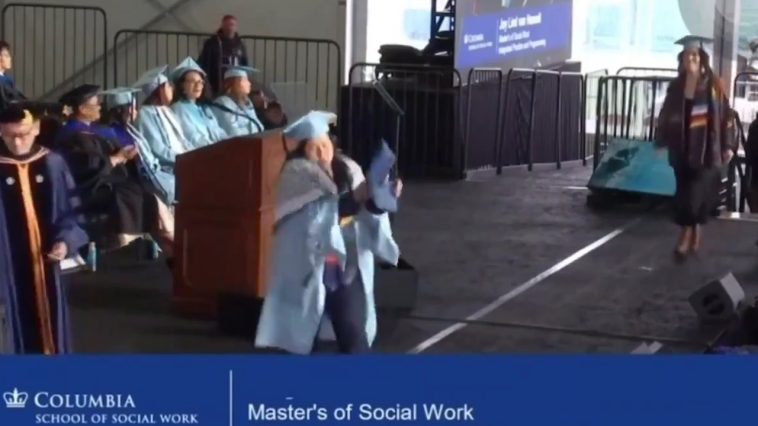At a recent graduation ceremony at Columbia University, social work students exhibited a distressing display of support for Palestine, including the act of symbolic self-imprisonment with zip ties and tearing their diplomas apart on stage. This incident followed the cessation of anti-Israel protests that had paralysed the campus for an extended period. These behaviors were visible in a livestream of the event; a notable participant was a graduate named Tarsis Salome.
Salome was witnessed with zip ties fastened around her wrists, a gesture that has garnered controversy. As she advanced towards the school official to receive her diploma, a small group of peers in the assembly were heard encouraging her through their applause. She proceeded to tear up her diploma into fragments and scattered them onto the stage, providing a spectacle unlike any traditional commencement ceremony.
Maliha Fairooz, another graduate, made a similar strong political statement. As reported by The New York Post, Fairooz had the audacious stunt of striding across the stage with her wrists bound and exhibiting the name of a Hamas leader inscribed on her graduation cap. These acts of defiance against convention and respect were noted as being in poor taste, especially in the setting of a grand occasion such as a graduation ceremony.
This regrettable exhibition surfaced in the wake of the university’s decision to cancel its comprehensive commencement event— a decision attributed to the disruptive demonstrations. In response to the upheaval, Columbia resolved to abandon their large-scale commencement scheduled for May 15, electing instead for a series of smaller, more personal, convocations spread over an entire week.
The university provided a rationale that the more intimate graduation ceremonies, sectionalized by discipline, would present a more personalized experience for the graduates. The declaration from the university emphasized the students’ preference for smaller graduation ceremonies, which held more significance and allowed for personalized familial pride.
A female queer-identifying Columbia University student ripped up they/their diploma upon receiving it. So that’s four years down the drain. pic.twitter.com/V6ElgYjWVu
— Ian Miles Cheong (@stillgray) May 13, 2024
In an official statement, the university made their stance clear. They acknowledged the role of the students’ desire for school-specific ceremonies, as well as the anticipation of recognition from their loved ones while crossing the stage. The university committed to directing their resources towards ensuring these individual school ceremonies proceed as comfortably, respectfully, and unabridged as possible.
Columbia University, a renowned member of the Ivy League, has found itself thrust into the limelight due to these events. The erstwhile serene Morningside campus was transformed into a protest ground, complete with tent encampments that put a halt to normal activities for students and faculty alike. The protestors went further to claim Hamilton Hall, prompting the university administration to call upon NYPD to dissolve the incumbents.
Acknowledging the arduous experiences of the past few weeks, the university expressed its commitment towards ensuring a remarkable graduation experience. They continue to incorporate student input and are considering the organization of an alternative event on May 15, likely to recompense the cancellation of the large, formal gathering.
The university’s leadership stressed their eagerness to unite in celebration of their graduates’ achievements in the face of these challenges. This gathering, they hope, would prove a morale boost to Columbians as they embark upon the next stages of their lives. The university reiterated their primary focus on the betterment of the community and preparing their students for future engagements.
The schedule details released by Columbia indicate that from May 10 to May 16, at disparate times throughout the day, these school-specific commencement ceremonies will take place. The steps taken by Columbia mirror those of the University of Southern California. USC also decided to call off its primary commencement function following a flurry of anti-Israel demonstrations.
While these changes to traditional ceremonies may be unsettling for some, they act as a reflection of the turbulent times and the political activities that have consumed campus life in recent times. Universities like Columbia and USC must balance tradition with the changing political climate, demonstrating both adaptability and the maintenance of decorum and respect.
The influence exerted by political activism and displays of solidarity, however disruptive, on the ostensibly ceremonial occasions like graduation is notable. It highlights the scope radical ideologies have in penetrating even the supposedly sacrosanct and celebratory events that mark significant milestones in the lives of students.
It is crucial, going forward, for universities and their student communities to understand how to constructively demonstrate political beliefs without risking the sanctity or essence of such monumental occasions. Maintaining the dignity and respect of these ceremonies, while embracing freedom of expression, keeps the focus on the triumph of academic accomplishment—celebrating what we have all worked so hard to achieve.


